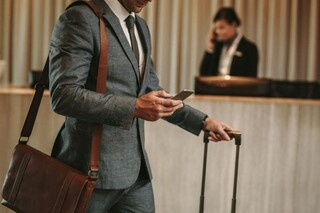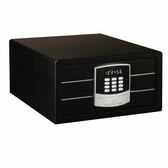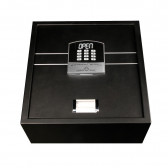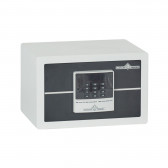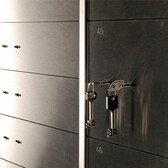On the web you can find videos that show how to easily open a hotel safe with a so-called master code. In practice, however, this does not prove the low efficiency of the safe deposit boxes, but only confirms the hotel's failure to comply with basic security procedures. A modern hotel safe should not have a "master code" at all – this is only found in older type safes. However, even older hotel safes that are well managed and used in the hotel room should have an individual "mastercode" configured, which allows the container to be opened by the staff in exceptional situations, e.g. if the guest forgets his or her set PIN.
Travel safety – it is better not to take risks
When travelling and staying in a hotel, it is important to remember to observe basic safety rules. If you leave your documents, wallet or electronics in your room, for example, there is a high risk of theft, which can cost you dearly. If you lose, for example, your passport in a distant, exotic country, you must reckon with the need to obtain a new document in the consulate or embassy, which is often associated with additional costs and, for example, unwanted extension of your stay. An even greater threat is the potential theft of identity, which can be used by a thief, for example to take out a loan against us. Therefore, it is worth booking stays in hotels that offer guests certified hotel safes in their rooms, as well as deposit boxes at reception.
The hotel safe – effective travel protection
A hotel safe is a special type of locker because it has two modes of operation. The first is for hotel guests. Upon check-in, they will find an open safe in their room. To use it, simply deposit items in it, then close the box and set your own PIN. The second mode is for the staff of the facility, who have access to the so-called master code or (in better class safes) an audit device allowing emergency opening of the safe together with a printout of the last few hundred operations. The master code, if any, must be configured as soon as the safe is purchased and installed in the hotel, and is known only to selected staff. The master code can be used, for example, when a hotel guest forgets his PIN. In this case, the staff will open the safe in his presence. On the other hand, if someone tries to "hit" the right code by typing in various wrong digit configurations, the safe triggers a time delay, makes further opening attempts difficult and requires the user to use a special mechanical or electronic key, which is usually kept by the facility manager.
Valuable items should be kept in a safe deposit box
When travelling with very valuable items, it is better not to place them in a safe in the room, but in a hotel depository. This kind of safe deposit box works on similar principles as in a bank. The hotel guest receives a case, in which he deposits e.g. jewellery. When we want to open it again, it is necessary to have a designated person from the hotel staff present. According to the procedures no one can open such a cash box by themselves. Importantly, the hotel is fully responsible for the items deposited.
Safety and hotel liability
It is worth remembering that hotels are legally obliged to be responsible for things brought by guests onto their premises. This is a very far-reaching liability, because it is based on the principle of risk, which means that the hotel will be liable for damage even in a situation where the damage to the guests' property did not result from its culpable action (e.g. theft of a suitcase in the lobby during check-in by a person from outside the hotel or another guest). The amount of financial compensation depends, among other things, on the cost of accommodation and can be up to 100 times the room rate. Therefore, it is in the interest of the facility to properly configure the safes, as well as to take care of appropriate security procedures. Therefore, in many hotels we will meet not only with safes, but also with additional security measures, such as monitoring and security services.
So you can be sure that a reputable hotel will take proper care of our safety. And if it doesn't? Well, it will bear full responsibility up to the amount of our damage. Any attempts to limit it in the registration forms will not only prove ineffective, because absolutely binding legal norms apply, but may even expose the hotel to fines imposed by the Office of Competition and Consumer Protection (UOKiK) for using the so-called abusive clauses. We write more about the liability of hotels for guests' property here.
This may interest you:
How to open a safe without a battery and what to do in case of failure?
Hotel safe and minibar – essential equipment for every hotel
